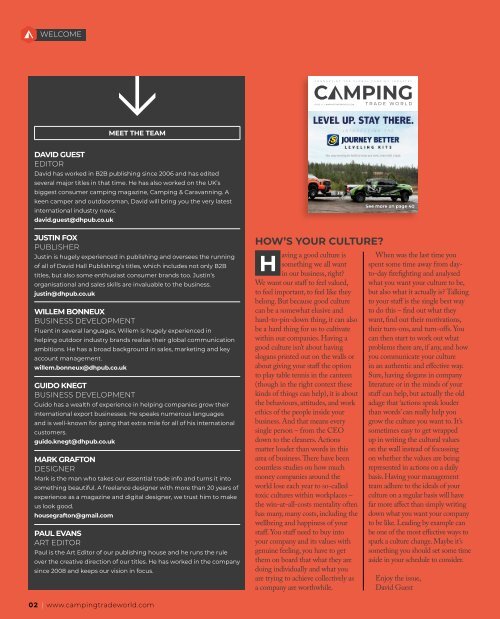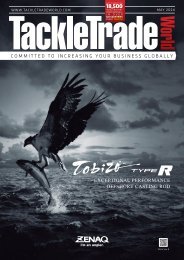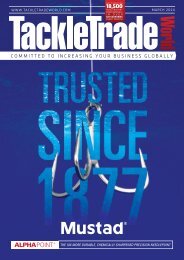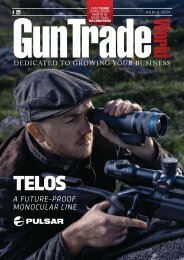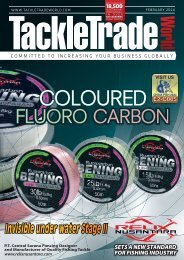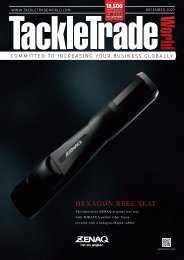Create successful ePaper yourself
Turn your PDF publications into a flip-book with our unique Google optimized e-Paper software.
WELCOME<br />
C O N N E C T I N G T H E G L O B A L C A M P I N G I N D U S T R Y<br />
ISSUE <strong>11</strong> | CAMPINGTRADEWORLD.COM<br />
MEET THE TEAM<br />
DAVID GUEST<br />
EDITOR<br />
David has worked in B2B publishing since 2006 and has edited<br />
several major titles in that time. He has also worked on the UK’s<br />
biggest consumer camping magazine, <strong>Camping</strong> & Caravanning. A<br />
keen camper and outdoorsman, David will bring you the very latest<br />
international industry news.<br />
david.guest@dhpub.co.uk<br />
JUSTIN FOX<br />
PUBLISHER<br />
Justin is hugely experienced in publishing and oversees the running<br />
of all of David Hall Publishing’s titles, which includes not only B2B<br />
titles, but also some enthusiast consumer brands too. Justin’s<br />
organisational and sales skills are invaluable to the business.<br />
justin@dhpub.co.uk<br />
WILLEM BONNEUX<br />
BUSINESS DEVELOPMENT<br />
Fluent in several languages, Willem is hugely experienced in<br />
helping outdoor industry brands realise their global communication<br />
ambitions. He has a broad background in sales, marketing and key<br />
account management.<br />
willem.bonneux@dhpub.co.uk<br />
GUIDO KNEGT<br />
BUSINESS DEVELOPMENT<br />
Guido has a wealth of experience in helping companies grow their<br />
international export businesses. He speaks numerous languages<br />
and is well-known for going that extra mile for all of his international<br />
customers.<br />
guido.knegt@dhpub.co.uk<br />
MARK GRAFTON<br />
DESIGNER<br />
Mark is the man who takes our essential trade info and turns it into<br />
something beautiful. A freelance designer with more than 20 years of<br />
experience as a magazine and digital designer, we trust him to make<br />
us look good.<br />
housegrafton@gmail.com<br />
PAUL EVANS<br />
ART EDITOR<br />
Paul is the Art Editor of our publishing house and he runs the rule<br />
over the creative direction of our titles. He has worked in the company<br />
since 2008 and keeps our vision in focus.<br />
HOW’S YOUR CULTURE?<br />
H<br />
■aving a good culture is<br />
something we all want<br />
in our business, right?<br />
We want our staff to feel valued,<br />
to feel important, to feel like they<br />
belong. But because good culture<br />
can be a somewhat elusive and<br />
hard-to-pin-down thing, it can also<br />
be a hard thing for us to cultivate<br />
within our companies. Having a<br />
good culture isn’t about having<br />
slogans printed out on the walls or<br />
about giving your staff the option<br />
to play table tennis in the canteen<br />
(though in the right context these<br />
kinds of things can help), it is about<br />
the behaviours, attitudes, and work<br />
ethics of the people inside your<br />
business. And that means every<br />
single person <strong>–</strong> from the CEO<br />
down to the cleaners. Actions<br />
matter louder than words in this<br />
area of business. There have been<br />
countless studies on how much<br />
money companies around the<br />
world lose each year to so-called<br />
toxic cultures within workplaces <strong>–</strong><br />
the win-at-all-costs mentality often<br />
has many, many costs, including the<br />
wellbeing and happiness of your<br />
staff. You staff need to buy into<br />
your company and its values with<br />
genuine feeling, you have to get<br />
them on board that what they are<br />
doing individually and what you<br />
are trying to achieve collectively as<br />
a company are worthwhile.<br />
When was the last time you<br />
spent some time away from dayto-day<br />
firefighting and analysed<br />
what you want your culture to be,<br />
but also what it actually is? Talking<br />
to your staff is the single best way<br />
to do this <strong>–</strong> find out what they<br />
want, find out their motivations,<br />
their turn-ons, and turn-offs. You<br />
can then start to work out what<br />
problems there are, if any, and how<br />
you communicate your culture<br />
in an authentic and effective way.<br />
Sure, having slogans in company<br />
literature or in the minds of your<br />
staff can help, but actually the old<br />
adage that ‘actions speak louder<br />
than words’ can really help you<br />
grow the culture you want to. It’s<br />
sometimes easy to get wrapped<br />
up in writing the cultural values<br />
on the wall instead of focussing<br />
on whether the values are being<br />
represented in actions on a daily<br />
basis. Having your management<br />
team adhere to the ideals of your<br />
culture on a regular basis will have<br />
far more affect than simply writing<br />
down what you want your company<br />
to be like. Leading by example can<br />
be one of the most effective ways to<br />
spark a culture change. Maybe it’s<br />
something you should set some time<br />
aside in your schedule to consider.<br />
Enjoy the issue,<br />
David Guest<br />
02 | www.campingtradeworld.com


